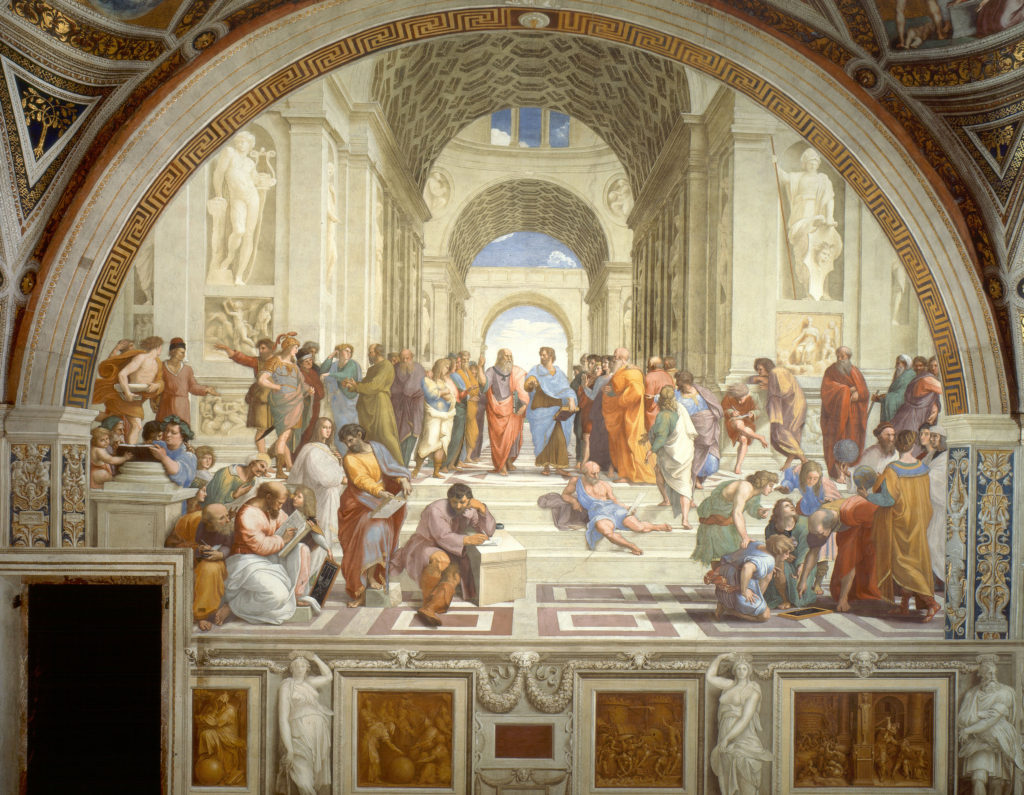“The classical philosophers had a close connection with the science of their times; some of them, such as Descartes and Leibniz, were leading mathematicians and physicists themselves.” – Hans Reichenbach, “The Philosophy of Space and Time”
In the centuries preceding the advent of what is now considered “modern science,” the study of nature and the physical universe was known as “natural philosophy.” The name itself implies an intimate connection between the sciences and philosophy. It begs the question: At what point did the two disciplines diverge?
Whether you’re a scientist studying the fundamental nature of the universe or a philosopher studying the fundamental nature of Man, you might ask yourself: Is the universe deterministic or probabilistic? Do time and space exist independently of the mind and why does time have an apparent unidirectional flow? Can machines think and if so, how do we define intelligence? These are just a couple of drops in an ocean of questions that demonstrate the intersection and symbiosis of science and philosophy. So when and why did philosophy and science grow so seemingly distant from one another in the world of higher education?
Natural philosophy is considered to have begun with the ancient Greek philosopher and scientist Aristotle. One of the defining traits of Aristotelian philosophy and science is its focus on first principles, which are defined by basic, foundational and self-evident propositions or assumptions such as: “If I go outside, the sky will be blue.” Aristotle’s interests included (as listed on Wikipedia): biology, zoology, psychology, physics, metaphysics, logic, ethics, rhetoric, music, poetry, economics, politics and government. As we can see he was a busy man, and his contributions laid the groundwork for scientists and philosophers alike hundreds of years after his death. Following Aristotle, the study of the natural world fell into this new category of philosophy known as natural philosophy. Many famous scientists and mathematicians that have since been redefined into specific disciplines were considered natural philosophers in their day.
Perhaps the most famous example is the natural philosopher Isaac Newton, who is today referred to as a physicist and a mathematician. One of Newton’s greatest achievements was his publication of the work that outlined his laws of motion, “Philosophiæ Naturalis Principia Mathematica,” which is Latin for “Mathematical Principles in Natural Philosophy.” Newton is famously quoted as saying, “Plato is my friend — Aristotle is my friend — but my greatest friend is truth,” as well as, “If I have seen further it is by standing on the shoulders of Giants,” so it is clear the influence philosophy had on his scientific discoveries. Another one of the giants preceding Newton was René Descartes, a famous philosopher, mathematician and scientist of the 17th century. Descartes famously stated, “I think, therefore I am.” His text “Meditations on First Philosophy” (1641) is still a standard in most university philosophy departments. Descartes is also credited as the father of analytical geometry, which bridges the gap between algebra and geometry and also laid a significant foundation that infinitesimal calculus was built upon by Newton and mathematician/philosopher Gottfried Wilhelm Leibniz in the 17th century.
Clearly, science and philosophy were intimately connected for thousands of years. So at what point did the two split? Many consider the divergence to have begun in the 19th century, when the word “science” became the standard for studying the natural world. Although it isn’t clear where the word itself came from, it’s clear that the word “scientist” was first coined by a philosopher named William Whewell. This word would go on to replace the standard of “natural philosopher” and at this point, the two began to really go off in distinct directions.
The beginning of this divergence can be traced even further back, however, to the epistemological shift of science that was brought on by Galileo Galilei and his experimental methods in the late 1500s and early 1600s. Galileo focused on experimentation and mathematical foundation as opposed to Aristotle’s focus on self-evident principles. Galileo also discussed and published thought experiments that indicated the inherent contradictions in Aristotle’s theories; one example is the Aristotelian theory that a heavy object would fall faster than a lighter object (which we now know as false). Galileo’s discreditation of Aristotle’s more philosophical view of science sowed discontent and furthered the divergence of the epistemologies that science and philosophy fall into.
Einsteinian relativity and quantum mechanics are the two pillars that modern physics is built upon. They both have incredible scientific and philosophical implications regarding the very nature of the universe. Aside from physics, artificial intelligence is seemingly right around the corner, and with it comes the question: How do we define intelligence? In biology, Darwin’s theory of evolution provided a profound shift in how we viewed humanity and our place on Earth. These landmarks across all fields of modern science showcase not only a significant leap in human understanding, but also philosophical shifts that have defined generations.
For thousands of years, it was believed that the Earth was the center of the Universe. With the introduction of astronomy as we know it today and the heliocentric model, everything had to change, and humanity was no longer the center of everything. Fast forward to modern day, and we’re realizing that we’re just a bunch of primates living on a giant rock flying through space around a giant fireball of gas in one of 100 billion galaxies (and those are only the galaxies we know of!). Now look at metaphysics, which is defined as the branch of philosophy that deals with the first principles of things, including abstract concepts such as being, knowing, substance, cause, identity, time and space. When considering time and space through a metaphysical lens, one also has to consider the implications of space and time as provided by Einsteinian relativity. Imagine the philosophical shift that would have to occur if we were to suddenly discover life on another planet?
In the modern realm of higher education and society in general, philosophy and science are oft defined as two distinct and separate entities. The problem with this modern decoupling of the two disciplines is that it teaches students “what” to think when in reality we should be taught “how” to think. Science and mathematics did not appear out of thin air. They are indicative of thousands of years of trial and error; of successes and failures; of hopes and ideas. The need to understand ourselves is not so different from the need to understand the universe and the natural phenomena that constitute the environment we exist in. Being forced to memorize an arbitrary equation for seemingly no reason squanders the insight and creativity that drives science forward. Without the lens of philosophy and deep introspection, some of our greatest achievements would never have come to fruition. It’s on the foundation of philosophical ideas that science has been allowed to grow and expand to what it has become today. By separating the two into mutually exclusive disciplines, we are dooming science and philosophy to collapse in on themselves due to their inability to sustain their own weights. For philosophy, science provides the context and the empiricism that validates its discoveries. And for science, philosophical ideas are what drive the creativity forward.




Comments are closed.